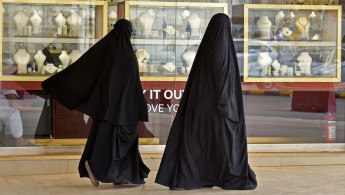Court rules that Saudi woman living alone 'should not punished'
Saudi Arabia still has strict laws restricting women's freedoms.
2 min read
Saudi women are subject to a male guardianship system [Getty-file photo]
A Saudi court ruled this week that a Saudi woman living alone should not be punished, after family in the ultra-conservative kingdom filed a complaint.
It comes after public prosecutors pursued the Saudi woman in court for being absent from her family home and travelling to Riyadh without her father's permission.
The prosecutor demanded the court punish the woman for her "repeated absense" from the family home.
It comes after public prosecutors pursued the Saudi woman in court for being absent from her family home and travelling to Riyadh without her father's permission.
The prosecutor demanded the court punish the woman for her "repeated absense" from the family home.
The judge dismissed the complaint saying that a "sane adult woman" has the right to live in a seperate home and the defendent should not be punished, according to Saudi Gazette.
"The court said in its ruling that the independence of the defendant in a separate house is not deemed a criminal offense that requires punishment," the Saudi daily wrote.
Under Saudi Arabia's guardianship laws, Saudi men have almost complete control over the lives of women relatives.
A Saudi woman needs a male guardian present to complete numerous administrative tasks and allows fathers, husbands and siblings to regulate everyday aspects of their lives.
Saudi Arabia has recently eased some of the restrictions for women aged-21 and over, allowing them to travel abroad without the permission of male relatives and to obtain a passport.
Critics say Crown Prince Mohammed bin Salman's reforms are "too little too late" and a veneer that hides a sweeping campaign of repression against activists, including women's rights' campaigners.
A driving ban on women was also overturned last year, in a change dubbed "cosmetic" by human rights campaigners.
Detained Saudi activist Loujain Al-Hathloul has been behind bars for two years, after protesting the male guardianship system and the ban on women drivers.
"The court said in its ruling that the independence of the defendant in a separate house is not deemed a criminal offense that requires punishment," the Saudi daily wrote.
Under Saudi Arabia's guardianship laws, Saudi men have almost complete control over the lives of women relatives.
|
|
A Saudi woman needs a male guardian present to complete numerous administrative tasks and allows fathers, husbands and siblings to regulate everyday aspects of their lives.
Saudi Arabia has recently eased some of the restrictions for women aged-21 and over, allowing them to travel abroad without the permission of male relatives and to obtain a passport.
Critics say Crown Prince Mohammed bin Salman's reforms are "too little too late" and a veneer that hides a sweeping campaign of repression against activists, including women's rights' campaigners.
A driving ban on women was also overturned last year, in a change dubbed "cosmetic" by human rights campaigners.
Detained Saudi activist Loujain Al-Hathloul has been behind bars for two years, after protesting the male guardianship system and the ban on women drivers.
Hathloul has been subjected to torture, sexual harrassment and threats of execution and rape during her detention, her family have said.
She has not been freed despite the change in law and the threat of coronavirus in Saudi prisons.
Saudi authorities have also been linked to a sexist smear campaign of women journalists deemed critical of the kingdom's ruler.
She has not been freed despite the change in law and the threat of coronavirus in Saudi prisons.
Saudi authorities have also been linked to a sexist smear campaign of women journalists deemed critical of the kingdom's ruler.





 Follow the Middle East's top stories in English at The New Arab on Google News
Follow the Middle East's top stories in English at The New Arab on Google News
![Israeli forces ordered bombed Gaza's Jabalia, ordering residents to leave [Getty]](/sites/default/files/styles/image_330x185/public/2176418030.jpeg?h=a5f2f23a&itok=_YGZaP1z)

